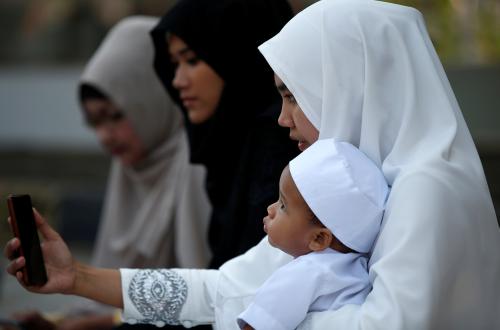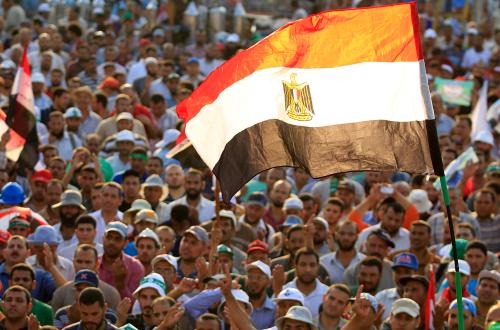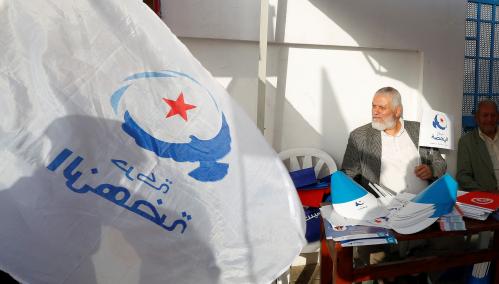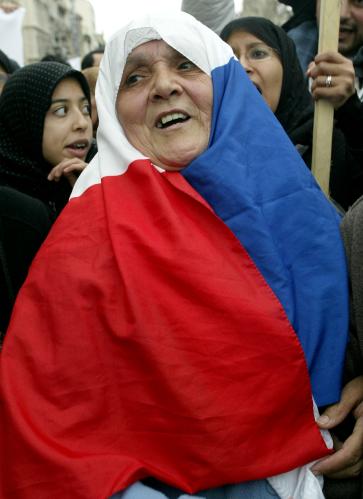Editors’ Note: Why do Islamists become Islamists?, Shadi Hamid asks. Marking the official release of the new paperback edition of his book Temptations of Power, Hamid examines a host of reasons, including—for many members of groups like the Muslim Brotherhood—simply the straightforward desire to obey God and become better Muslims. This post was originally published on PBS Newshour.
Political scientists, myself included, have tended to see religion, ideology, and identity as “epiphenomenal”—products of a given set of material factors. These factors are the things we can touch, grasp, and measure. For example, when explaining why suicide bombers do what they do, we assume that these young men are depressed about their own accumulated failures, frustrated with a dire economic situation, or humiliated by political repression and foreign occupation. While these are all undoubtedly factors, they are not—and cannot be—the whole story.
But the role, and power, of religion in the modern Middle East is more mundane than that (after all, the overwhelming majority of Muslims do not think about becoming suicide bombers). “Islamism” has become a bad word, because the Islamists we hear about most often are those of ISIS and al-Qaeda. Most Islamists, however, are not jihadists or extremists; they are members of mainstream Islamist movements like the Muslim Brotherhood whose distinguishing feature is their gradualism (historically eschewing revolution), acceptance of parliamentary politics, and willingness to work within existing state structures, even secular ones. Contrary to popular imagination, Islamists do not necessarily harken back to seventh century Arabia.
Why do Islamists become Islamists? There are any number of reasons, and each Brotherhood member has his or her own conversion story or “born-again” moment. As one Brotherhood member would often remind me, many join the movement so that they can “get into heaven.” To dismiss such pronouncements as irrational bouts of fancy is tempting. But, if you look at it another way, what could be more rational than wanting eternal salvation?
Islamists aren’t just acting for this world, but also for the next. Muslim Brotherhood and Brotherhood-inspired organizations aim to strengthen the religious character of individuals through a multi-tiered membership system and an educational process with a structured curriculum. Each brother is part of a “family,” usually consisting of 5 to 10 members, which meets on a weekly basis to read and discuss religious texts. For many members, it is quite simple and straightforward. Being a part of the Brotherhood helps them to obey God and become better Muslims, which, in turn, increases the likelihood of entry into paradise. This belief doesn’t mean that these more spiritually-focused members don’t care about politics; but they may see political action—whether running for a municipal council seat or joining a mass protest—as just another way of serving God.
The tendency to see religion through the prism of politics or economics (rather than the other way around) isn’t necessarily incorrect, but it can sometimes obscure the independent power of ideas that seem, to much of the Western world, quaint and archaic. It can be difficult to understand how people are able and willing to do seemingly irrational things in the service of seemingly irrational ends. The forces of reason and rationality, if they haven’t already prevailed, were, after all, supposed to prevail eventually. The modern Middle East seems to defy such expectations. As Robert Kagan writes: “For a quarter-century, Americans have been told that at the end of history lies boredom rather than great conflict.” Francis Fukuyama, the very scholar who first proclaimed the “end of history” in 1989, seemed almost wistful by that famous essay’s final paragraph. “I have the most ambivalent feelings for the civilization that has been created in Europe since 1945,” he wrote. “Perhaps this very prospect of centuries of boredom at the end of history will serve to get history started once again.” The increasingly apparent influence of religion on politics suggests that Fukuyama was more prescient than his critics give him credit for.
When religion is less relevant in our own lives, it can be difficult to make that jump, to not just understand—but to relate—to its meaning and power for believers, and for those, in particular, who believe they have a cause beyond this life. Outsiders have to make an extra effort to close that gap. And that, in some ways, is the most challenging, and ultimately rewarding, aspect of my work: to be exposed to something fundamentally different.
To understand Islamists, you have to sit with them, talk to them, and get to know them as individuals with their own fears and aspirations. This is where I think it’s important for Western analysts, academics, and policymakers to cordon off their own beliefs and political commitments. Just because I’m an American and a small-l liberal (and those two, in my case, are intertwined), doesn’t mean that Egyptians or Jordanians or anyone else should be subject to my ideological preferences. If you go into the study of Islamism trying to compare Islamists to some liberal ideal, then that will distort your analysis. Islamists, after all, are products of their own political context, not ours.
To us, democracy and liberal democracy might seem interchangeable, but, in the Middle East (as well as many other places), they’re not. In our own history as Americans, we followed a particular sequencing: first, the foundations of constitutional liberalism were established and only then did democracy—in the sense of universal suffrage, popular sovereignty, and full political equality of all citizens—become a reality (eventually). In many Muslim-majority societies, the tensions between liberalism and democracy are constantly on display. We might not like it — and, in some sense, we shouldn’t like it – but what if a majority of citizens in a given country want to pass legislation that bans alcohol, segregates the sexes at various levels of public schooling, empowers clerics, or “Islamizes” the educational curriculum? These are all things that, at some level, restrict or constrain individual freedom and liberty.
We don’t need to speculate: Two oft-cited “models” of Muslim democratic success—Indonesia and Malaysia—feature significantly more sharia ordinances than Egypt, Tunisia, Turkey, Algeria, Morocco, or Lebanon, to name only a few. In one article, the Indonesia scholar Robin Bush documents sharia by-laws implemented in South Sulawesi, West Java, and other conservative regions. They include: requiring civil servants and students to wear “Muslim clothing,” requiring women to wear the headscarf to receive local government services; requiring demonstrations of Quranic reading ability to be admitted to university or to receive a marriage license. But there’s a catch. According to one study by the Jakarta-based Wahid Institute, most of these regulations have come from officials from secular parties like Golkar. How is this possible? The implementation of sharia law is part of mainstream discourse that cuts across party lines, suggesting that Islamism is not necessarily about Islamists but is about a broader population that is open to sharia ordinances. As the leading scholar of Islamism in Southeast Asia Joseph Liow writes, “the piecemeal implementation of sharia by-laws across Indonesia has not elicited widespread opposition from local populations.”
Islamism, then, doesn’t necessarily require Islamists. On the other hand, it is very difficult to have liberalism without liberals, and liberals have remained weak in most Muslim-majority countries. In the two fascinating and often overlooked cases of Indonesia and Malaysia, democracy went hand in hand with Islamization. To put it differently, where many assume that democracy can’t exist with Islamism, it is more likely the opposite.





Commentary
What most people get wrong about political Islam
October 1, 2015